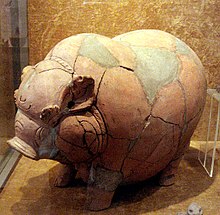Economy

Majapahit Terracotta Piggy Bank, 14–15 century AD Trowulan, East Java. (Collection of National Museum of Indonesia, Jakarta)
Some idea of scale of the internal economy can be gathered from scattered data in inscriptions. The Canggu inscriptions dated 1358 mentions 78 ferry crossings in the country (mandala Java).[24] Majapahit inscriptions mention a large number of occupational specialities, ranging from gold and silver smiths to drink vendors and butchers. Although many of these occupations had existed in earlier times, the proportion of the population earning an income from non-agrarian pursuits seems to have become even greater during the Majapahit era.
The great prosperity of Majapahit was probably due to two factors. Firstly, the northeast lowlands of Java were suitable for rice cultivation, and during Majapahit's prime numerous irrigation projects were undertaken, some with government assistance. Secondly, Majapahit's ports on the north coast were probably significant stations along the route to obtain the spices of Maluku, and as the spices passed through Java they would have provided an important source of income for Majapahit.[24]
The Nagarakertagama states that the fame ruler of Wilwatikta (a synonym for Majapahit) attracted foreign merchants from far and wide, including Indians, Khmers, Siamese, and Chinese among others. A special tax was levied against some foreigners, possibly those who had taken up semi-permanent residence in Java and conducted some type of enterprise other than foreign trade.

Tidak ada komentar:
Posting Komentar